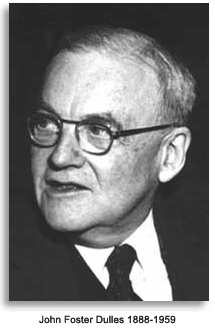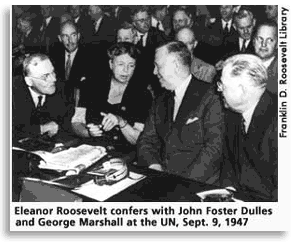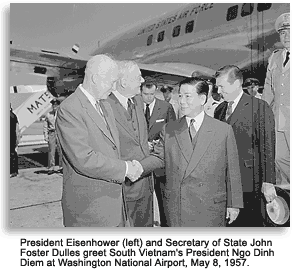John Foster Dulles served as secretary of state in the Dwight D. Eisenhower administration. His policies were firmly anti-communist and he was instrumental in the formation of the Southeast Asia Treaty Organization, which was designed to prevent communism from coming to power in any more countries in that region.
 Dulles was born on February 25, 1888, in Washington, D.C. His father was a Presbyterian minister, and Dulles developed strong religious beliefs that remained with him throughout his life. During the 1920s and 1930s, Dulles attended numerous international churchmen’s conferences.
His family background included a grandfather, John Watson Dulles, who served as secretary of state under Benjamin Harrison. His uncle, Robert Lansing, was secretary of state for the Woodrow Wilson administration. His older brother, Allen Welsh Dulles, was the CIA head under Eisenhower. Dulles' first taste of diplomacy came in 1907, when his grandfather brought him along to the Hague Peace Conference.
Dulles attended Princeton, the Sorbonne, and George Washington universities. He obtained a law degree from GWU and then entered the New York law firm of Sullivan and Cromwell, Wall Street’s most powerful law firm. He specialized in international law and later became its senior partner.
Bad eyesight prevented his entering combat during World War I, but he served in the Army Intelligence Service instead. Following the armistice, he was legal counsel to the United States delegation to the Versailles Peace Conference.
Dulles developed a close relationship with Thomas Dewey and was Dewey's foreign policy advisor during the latter's presidential campaign of 1948. In 1945, Dulles was an advisor to Arthur H. Vandenberg at the United Nations Charter Conference in San Francisco, where he helped draft its charter preamble.
In 1949, Governor Dewey appointed Dulles to fill the U.S. Senate seat vacated by Robert Wagner, due to failing health. Dulles served in the Senate, but lost the special election held in November of the same year.
Dulles was born on February 25, 1888, in Washington, D.C. His father was a Presbyterian minister, and Dulles developed strong religious beliefs that remained with him throughout his life. During the 1920s and 1930s, Dulles attended numerous international churchmen’s conferences.
His family background included a grandfather, John Watson Dulles, who served as secretary of state under Benjamin Harrison. His uncle, Robert Lansing, was secretary of state for the Woodrow Wilson administration. His older brother, Allen Welsh Dulles, was the CIA head under Eisenhower. Dulles' first taste of diplomacy came in 1907, when his grandfather brought him along to the Hague Peace Conference.
Dulles attended Princeton, the Sorbonne, and George Washington universities. He obtained a law degree from GWU and then entered the New York law firm of Sullivan and Cromwell, Wall Street’s most powerful law firm. He specialized in international law and later became its senior partner.
Bad eyesight prevented his entering combat during World War I, but he served in the Army Intelligence Service instead. Following the armistice, he was legal counsel to the United States delegation to the Versailles Peace Conference.
Dulles developed a close relationship with Thomas Dewey and was Dewey's foreign policy advisor during the latter's presidential campaign of 1948. In 1945, Dulles was an advisor to Arthur H. Vandenberg at the United Nations Charter Conference in San Francisco, where he helped draft its charter preamble.
In 1949, Governor Dewey appointed Dulles to fill the U.S. Senate seat vacated by Robert Wagner, due to failing health. Dulles served in the Senate, but lost the special election held in November of the same year.
 Although a strong proponent of international cooperation, Dulles became disillusioned with the Soviet Union after experiencing firsthand their intransigence during international meetings. Gradually, Dulles became a critic of Harry S. Truman and his policy of containing communism. In Dulles' view, the United States should have been actively promoting liberation. He got his chance to put theory into practice when newly elected President Eisenhower selected him to be secretary of state, in 1953.
It was Dulles' policy that the United States should curb Soviet expansion with the threat of massive atomic retaliation. His critics blamed Dulles for hurting relations with communist countries, thereby deepening the Cold War's effects. Dulles recognized the dangers of brinksmanship,* but argued that it was still safer than appeasement.
In an article for Life Magazine, Dulles wrote about brinksmanship, “The ability to get to the verge without getting into the war is the necessary art." In actual practice, he was unable to roll back any of the gains that the communists had made during the Truman years, and he found no way to support uprisings in East Germany in 1953 or Hungary in 1956.
The Southeast Asia Treaty Organization (SEATO), which Dulles helped to organize, was formed in 1954. The treaty, signed in Manila by the United States, Australia, New Zealand, the United Kingdom, France, Pakistan, Thailand and the Philippines, obliged all its signatories to help defend against aggression in the Pacific region.
Dulles promoted the idea strongly and believed it would be a bulwark against further communist expansion. Unfortunately, the agreement proved to be ineffective when the United States alone had to defend attacks by the Viet Minh against three non-communist states, in 1963.
Dulles initiated the policy of strong support for Ngo Dinh Diem's regime in South Vietnam. He opposed the British and French invasion of Egypt during the Suez Crisis, but later turned against Egyptian president Gamal Abdul Nasser and prevented American military support for Egypt. That backfired, because the Soviet Union filled the void and gained a strategic foothold in the region.
Although a strong proponent of international cooperation, Dulles became disillusioned with the Soviet Union after experiencing firsthand their intransigence during international meetings. Gradually, Dulles became a critic of Harry S. Truman and his policy of containing communism. In Dulles' view, the United States should have been actively promoting liberation. He got his chance to put theory into practice when newly elected President Eisenhower selected him to be secretary of state, in 1953.
It was Dulles' policy that the United States should curb Soviet expansion with the threat of massive atomic retaliation. His critics blamed Dulles for hurting relations with communist countries, thereby deepening the Cold War's effects. Dulles recognized the dangers of brinksmanship,* but argued that it was still safer than appeasement.
In an article for Life Magazine, Dulles wrote about brinksmanship, “The ability to get to the verge without getting into the war is the necessary art." In actual practice, he was unable to roll back any of the gains that the communists had made during the Truman years, and he found no way to support uprisings in East Germany in 1953 or Hungary in 1956.
The Southeast Asia Treaty Organization (SEATO), which Dulles helped to organize, was formed in 1954. The treaty, signed in Manila by the United States, Australia, New Zealand, the United Kingdom, France, Pakistan, Thailand and the Philippines, obliged all its signatories to help defend against aggression in the Pacific region.
Dulles promoted the idea strongly and believed it would be a bulwark against further communist expansion. Unfortunately, the agreement proved to be ineffective when the United States alone had to defend attacks by the Viet Minh against three non-communist states, in 1963.
Dulles initiated the policy of strong support for Ngo Dinh Diem's regime in South Vietnam. He opposed the British and French invasion of Egypt during the Suez Crisis, but later turned against Egyptian president Gamal Abdul Nasser and prevented American military support for Egypt. That backfired, because the Soviet Union filled the void and gained a strategic foothold in the region.
 Dulles's humanitarian contributions included:
Dulles's humanitarian contributions included: